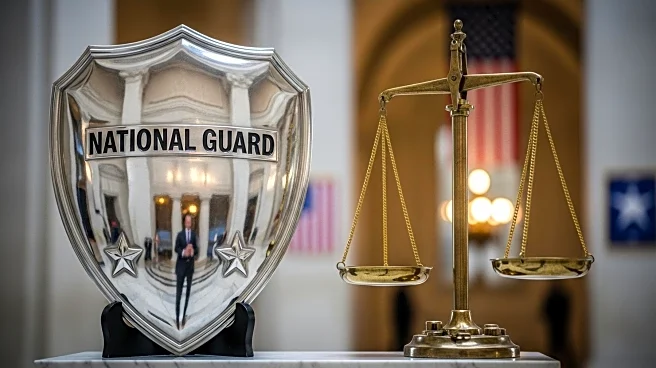What is the story about?
What's Happening?
A lawsuit filed by Washington, D.C. challenges the deployment of National Guard soldiers on city streets, highlighting the tension between state and federal powers. The District's Attorney General describes the deployment as a 'forced military occupation,' while the White House argues that the soldiers are protecting federal assets and assisting law enforcement. This legal battle underscores the complexities of the National Guard's dual mission, which allows it to operate under state or federal command depending on the situation. The deployment in D.C. involves Airmen and soldiers from various states, complicating the chain of command and legal framework. The Guard's dual mission is designed to provide agility with legal guardrails, operating under state active duty, Title 32, or Title 10, each with distinct command structures and funding sources.
Why It's Important?
The legal and political challenges surrounding the National Guard's deployment in Washington, D.C. have significant implications for federal and state authority. The situation tests the Guard's ability to balance its dual mission effectively, impacting public trust and democratic legitimacy. The deployment raises questions about the appropriate legal status and duration of military presence on U.S. streets, which are critical to maintaining public confidence. The outcome of this legal battle could influence future deployments and the Guard's role in domestic security, affecting how federal and state powers are exercised in emergency situations. The case also highlights the need for clear communication and transparency regarding the Guard's mission and objectives to prevent public cynicism.
What's Next?
The lawsuit's resolution will likely set precedents for future National Guard deployments in Washington, D.C. and other areas. Key stakeholders, including lawmakers, may consider legislative measures to clarify activation triggers, notice requirements, and reporting for extended Guard missions. Proposals could include granting the D.C. mayor veto power over the Guard in non-federal emergencies, with a rapid federal override when national interests demand it. Additionally, the use of a Dual Status Commander could be explored to integrate local and federal efforts while maintaining legal boundaries. Public briefings on mission statements, legal authority, and exit criteria may be necessary to ensure transparency and public trust.
Beyond the Headlines
The deployment of the National Guard in Washington, D.C. raises broader questions about the balance of power between federal and state authorities. The unique status of D.C., where the President acts as the governor for the National Guard, provides the White House with direct leverage over domestic security tools, which could be seen as both advantageous and risky. The situation calls for a reevaluation of the Guard's role in domestic operations, emphasizing the need for precision in authority, scope, and time to maintain public confidence. The legal and political dimensions of this case could lead to long-term shifts in how the Guard is utilized in domestic security.














